A boon to business and economy
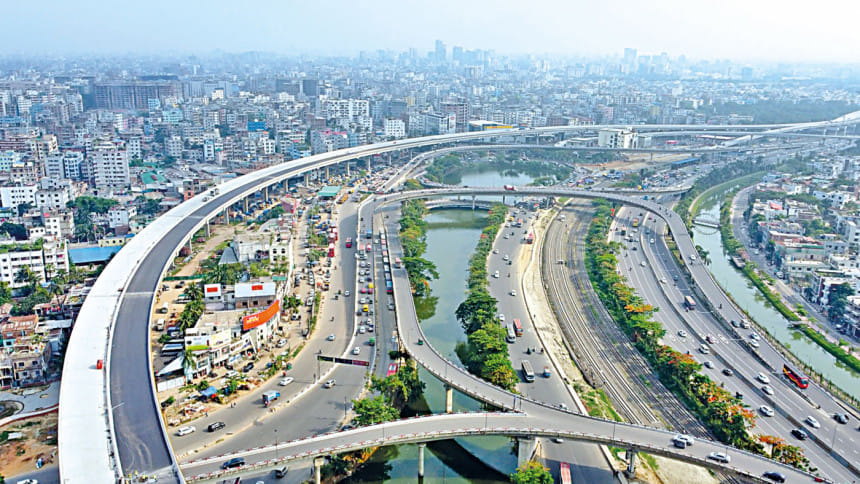
A massive transformation is set to occur in the transportation of goods and passengers with the opening of the country's first elevated expressway in Dhaka. Economists and businesses have said that this mega-infrastructure project will significantly reduce both the time and cost of doing business.
According to a study by the Accident Research Institute of Bangladesh University of Engineering and Technology (BUET) in 2018, Bangladesh loses Tk 37,000 crore and five million working hours annually due to heavy traffic congestion in Dhaka. The operations of the expressway are expected to address these losses to a great extent, businesses have stated.
Prime Minister Sheikh Hasina is scheduled to inaugurate the Airport-Farmgate section of the Dhaka Elevated Expressway on 2 September. This expressway will ease traffic congestion and shorten the lead time for export and import activities, as goods-laden trucks and covered vans will encounter less congestion.
For instance, if a cargo-laden covered van needs to travel from Farmgate to Hazrat Shahjalal International Airport (HSIA), it will now take only 10 minutes, whereas it currently takes up more than an hour due to traffic congestion.
This reduction in lead time is of significant importance for the export and import of goods, especially in the apparel trade, due to fierce competition in the global supply chain. International clothing retailers and brands have shortened lead times to 45 to 60 days, and sometimes even to 30 days, to ensure quick delivery of goods.
As a result, local businesses opt for expensive air shipments to meet the strict lead-time requirements set by international trading partners, necessitating faster movement of vehicles.
However, local exporters have been voicing complaints about poor road connectivity and inadequate facilities at HSIA for exporting goods. Many have missed flights because covered vans cannot reach HSIA in a timely manner due to hours-long traffic congestion on the roads leading to the airport in Dhaka.
In the post-LDC era, shorter lead times, improved infrastructure, and better logistics services are crucial for competitiveness, especially with the erosion of preferential trade facilities. In such circumstances, businesses must strive to be competitive by saving time, reducing lead times, and lowering the cost of doing business through enhanced road and port connectivity.
The operation of the elevated expressway is expected to contribute to the improvement of the global logistics index, as Bangladesh has recently performed strongly in this vital ranking for the construction of mega infrastructures.
For instance, Bangladesh's ranking in the World Bank's Logistics Performance Index (LPI) for 2023 has risen by 12 places, indicating an improvement in the country's trade and business skills.
According to the report released in April this year, Bangladesh's rank in the index, which assesses 139 countries, has climbed from 100 in 2018 to 88. Bangladesh achieved a score of 2.6 on a 5-point scale, securing third place among the five South Asian nations evaluated by the World Bank.
The expressway will accelerate the movement of goods-laden trucks and covered vans, a critical need in Dhaka where vehicle speeds are currently less than 10 kilometers (km) per hour due to severe traffic congestion, as stated by M Masrur Reaz, Chairman and Founder of Policy Exchange Bangladesh, a private think tank.
Reaz added that the expressway will help address the losses incurred due to traffic congestion. Furthermore, it will connect major industrial belts such as Savar, Gazipur, Narsingdi, and Narayanganj.
Additionally, the expressway will link to the proposed multimodal transport hub at Dhirashram in Gazipur, enhancing road connectivity and generating more economic activities, leading to employment opportunities and contributions to the economy.
However, Reaz suggested that the entry and exit points of the expressway should be kept open to prevent vehicles from experiencing long waiting times due to traffic congestion. Slow transport and labor movement incur economic costs, and the expressway is expected to alleviate these problems significantly.
Syed Ershad Ahmed, President of the American Chamber of Commerce in Bangladesh (AmCham), also emphasized that the expressway will have a positive impact on the economy by saving working hours and improving the country's image. Foreign investors seek efficient communication and time savings, and the expressway will reduce congestion on common roads leading to the Hazrat Shahjalal International Airport (HSIA), facilitating the transportation of goods.
Faruque Hassan, President of the Bangladesh Garment Manufacturers and Exporters Association (BGMEA), expressed that the expressway will undoubtedly benefit the apparel sector, which relies on timely deliveries. Delays in shipments often result in order cancellations or significant discounts demanded by international retailers and brands from local suppliers. The expressway is expected to mitigate such challenges in the garment business.
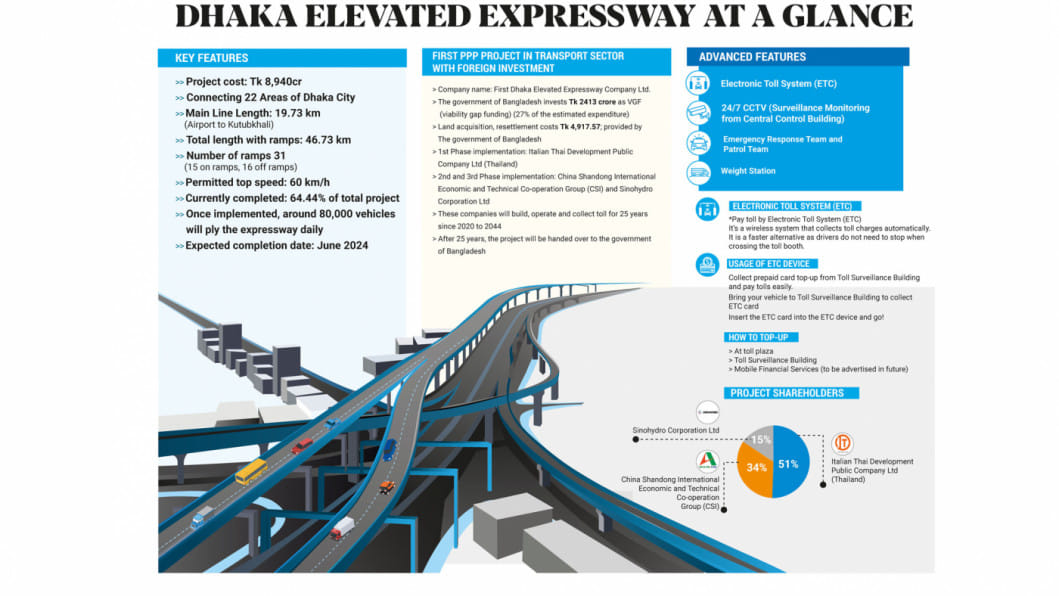
Moreover, alongside the elevated expressway, other infrastructure projects such as the metro rail and the third terminal at HSIA will further enhance business operations and improve the country's image. For example, the opening of the metro rail up to the commercial district Motijheel will significantly alleviate traffic congestion and boost business activities in major business hubs. Additionally, the expressway will facilitate smoother goods transportation between Dhaka and Chattogram port for export and import purposes.
S.M. Jahangir Hossain, President of the Bangladesh Fruits, Vegetables & Allied Product Exporter's Association, stated that not only will the export and import sectors benefit from the expressway, but also other industries.
Vegetable and other perishable goods exporters sometimes complain about missing flights due to delays in reaching Hazrat Shahjalal International Airport (HSIA) caused by heavy traffic congestion on the roads leading to the airport.
Kabir Ahmed, President of the Bangladesh Freight Forwarders Association (BAFFA), also noted that the elevated expressway will streamline their operations at the airport by saving time.
Md. Amin Helaly, Senior Vice-President of the Federation of Bangladesh Chambers of Commerce and Industry (FBCCI), the country's apex trade body, highlighted the obvious positive impact of the expressway. He mentioned that it currently takes more than two hours to travel from Uttara to Farmgate, but through the expressway, it will take less than half an hour. Therefore, the expressway will increase working hours for businesses.
Helaly also pointed out that in 2009, Bangladesh's GDP was $90 billion, and now it has reached $471 billion, indicating robust economic growth in the country. The reduction in time and cost of doing business from the operation of the expressway will lead to faster business turnover.
Road Transport and Bridges Minister Obaidul Quader, during a press briefing last week, announced that an 11.50km section from Kawla in the airport area to Farmgate will be opened first. He also mentioned that the highest speed limit for vehicles on the expressway would be 60 km/h, and it would take around 10 minutes to reach Farmgate from the airport area.
However, three-wheelers, motorcycles, bicycles, and pedestrians will not be allowed on the expressway, which was constructed under a public-private partnership.

 For all latest news, follow The Daily Star's Google News channel.
For all latest news, follow The Daily Star's Google News channel. 
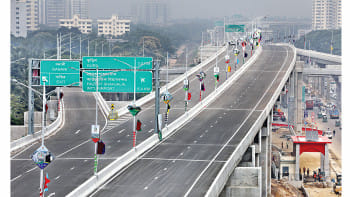


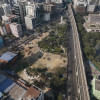
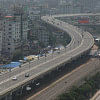
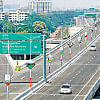



Comments